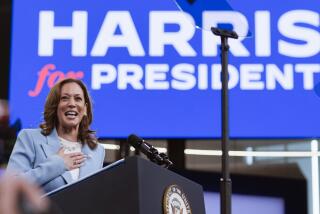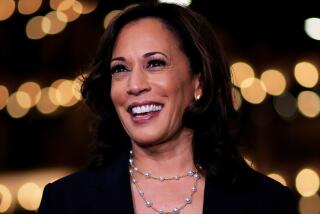Big Lead Could Ensure Early Victory, Aides Say : Dukakis Camp Sees a Way to Lock It Up
- Share via
BOSTON — Even though he was shut out of delegates in the Illinois primary Tuesday, Democratic presidential candidate Michael S. Dukakis still can lock up his party’s nomination before the convention next July, officials in his campaign said Wednesday.
Although he still leads his rivals in delegates and money, Dukakis has little hope of winning the required simple majority of delegates outright in the 22 remaining contests, his aides concede. A majority is 2,082 delegates.
Instead, the Massachusetts governor hopes to open a convincing lead over his rivals by winning at least 1,500 delegates by the final California and New Jersey contests on June 7. At that point, strategists say, he can draw hundreds of uncommitted and wavering delegates to his side to make up the difference.
Need ‘Commanding Plurality’
“I think there’s a growing sense that the party wants to coalesce around one candidate,” said Susan Estrich, campaign manager. “If we can have a commanding plurality of delegates on June 8, I have no doubt we’ll win the nomination.”
Tad Devine, Dukakis’ national field director, acknowledged that the campaign strategy involves more than traditional delegate arithmetic. “I think it’s algebra,” he said with a smile.
But Devine, one of the strategists of Walter F. Mondale’s successful delegate-gathering operation in 1984, also insisted that the nomination is “doable” for Dukakis.
“Not by doing 2,082,” he said. “But by putting distance between himself and his opponents.”
Devine said the minimum “magic number” for that spread to lead to victory is still unclear, but he estimated that a lead of 250 or 300 delegates at the end of April, when about 80% of the delegates will have been chosen, may be sufficient.
The question of how the muddled field of Democrats can produce a clear winner and avoid weeks of divisive squabbling and horse-trading before and during the Atlanta convention has dominated party circles in recent days.
Sees Brokered Convention
Illinois Sen. Paul Simon, who won his home state with 42% of the vote but has lost everywhere else, has argued that a brokered convention is inevitable. The party’s last such battle was in 1952.
That scenario has found little favor with party leaders. Democratic Party Chairman Paul G. Kirk Jr. has said he would ask other candidates to rally behind the delegate leader after the final primaries.
Depending on who is counting, actual tallies of delegates vary because of vagaries in various states’ reporting and in the counts of unpledged delegates.
According to Devine’s calculations, Dukakis leads his rivals with 560 delegates so far. That’s about 100 more than the most recent Associated Press tally.
Devine said Dukakis is followed by the Rev. Jesse Jackson with 479 delegates, Tennessee Sen. Albert Gore Jr. with 352, Simon with 183, and Missouri Rep. Richard A. Gephardt with 145.
More than half of the available delegates have already been allocated, by Devine’s calculations.
His count does not include the 645 uncommitted Democratic “super delegates.” These include party leaders, members of the Democratic National Committee, Democratic governors and 80% of the Democrats in Congress.
Strong Challenges Ahead
Whatever the arithmetic, aides acknowledge that Dukakis first must fend off a series of challenges in upcoming contests if he is to win the nomination. That may not be easy.
Gephardt has funneled his remaining resources into Michigan’s April 26 caucuses. Jackson has a strong base in the state as well.
Gore’s aides say he may take on Dukakis in Connecticut on March 29, hoping to embarrass the Massachusetts governor close to home. And Simon may offer stiff competition in Wisconsin, which votes on April 5. After that, starting April 19, come the giants: New York, Pennsylvania, Ohio, Indiana, New Jersey and California.
More to Read
Sign up for Essential California
The most important California stories and recommendations in your inbox every morning.
You may occasionally receive promotional content from the Los Angeles Times.











